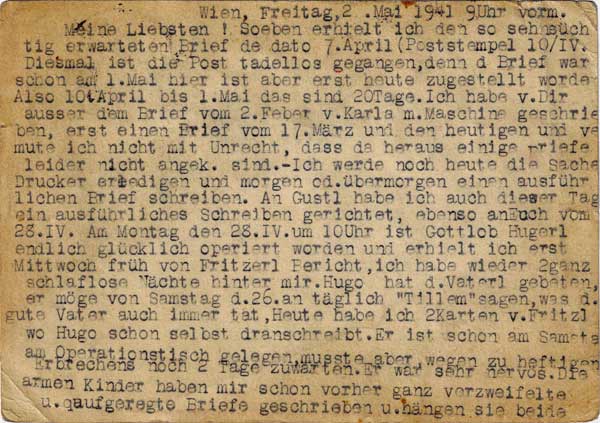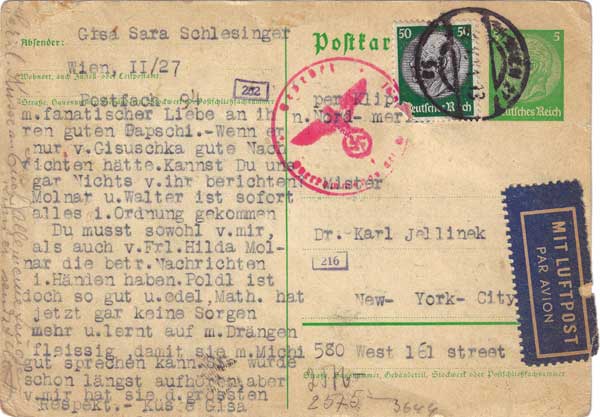

Author(s) / Origin of Letter |
Recipient(s) / Relationship to Author(s) / Destination of Letter |
Summary |
|
Gisela Jellinek Schlesinger
[Vienna, Austria] |
Gisela continues to write about details of family correspondence and about dealing with a ‘machine matter,’ which is likely connected with the theft of her brother-in-law, Miron Nadel’s photographic printer on the night of the November 1938 Kristallnacht pogrom. There is news of the successful surgery her brother, Hugo, had in Brünn, and a description of the worries that she and Hugo’s two younger daughters had about the surgery. The postcard reports that Mathilde, Karla’s mother, is urgently learning English and that Hugo longs for good news from his eldest daughter, Gisella Nadja. There is a loving greeting from Mathilde.
|
|
Vienna, Friday, May 2, 1941 9 a.m. My dearest ones! I just received the much desired and waited-for letter dated April 7, (postmarked April 10). This time the post office is blameless, since the letter was here on the first of May, but delivered only today. So, from April 10 to May 1, that is [only] 20 days. Apart from the typed letter from Karla of Feb. 2, I have from you only a letter from March 17th and today’s letter. I suppose not without reason, that since then, a few letters did not arrive. — Today, I will still take care of the printer matter1 and tomorrow or the next day, write a detailed letter. I have also addressed a detailed letter to Gustl2 today, and the same to all of you on April 28th. On Monday, April 28, around 10 o’clock, thank God, Hugerl [Hugo3] was finally successfully operated on and I only got a report on Wednesday morning from Fritzerl [Fritzi4]; I have two completely sleepless nights again behind me. Hugo begged father to read from Psalms daily from Saturday, the 26th onward, which the good father always does.5 Today I received two postcards from Fritzl, on which Hugo himself had written. He had already been lyng on the operating table on Saturday, but had to wait an extra two days because of heavy vomiting. He was very nervous. The poor children6 wrote to me earlier, completely despairing and worried letters, and they both hang [other side] with fanatical love on their good Papa. — If he only had good news from Gisuschka [Gisella Nadja7]. Can’t you tell us anything about her? Everything came immediately in order for Molnar and Walter.8 You must have [heard] both from me as well as from Miss HIlda Molnar, the sad news at hand. Poldi [Leopold Schlesinger9] is certainly so good and noble. Mathilde10 has no more worries now and studies very industriously and with urgency, so that she can speak well with Michi. She was going to give up long ago, but she has the greatest respect from me. Kisses, Gisa [Hand-written by Mathilde Eckstein, along the left margin of the postcard’s address-side:] Warm kisses to you all my dear children, [ ? ] Mama |
 [other side]  |
Translated by staff at the Leo Baeck Institute, under the supervision of Michael Simonson, edited by P. Jellinek
N.B. Gisela added the ‘middle name’ “Sara” to her name, in compliance with the Nazi regime’s August 1938 law that ordered all Jewish women whose first names did not sufficiently identify them as Jewish (names declared of “non-Jewish origin”) to add “Sara,” and men with similarly “non-Jewish origin” names to add “Israel.” Note the censors’ marks and the Nazi eagle and swastika stamp above and below Dr. Karl Jellinek’s address. Gisela did not include any specific mention of emigration or hardship in this postcard, knowing full well that the Nazi censors would be reading it. Thus, we cannot know for certain from this postcard, nor from Gisela’s final message in the early June 1941 family letter, what Gisela was then truly feeling, experiencing and expecting to happen.
Footnotes
1. The ‘printer matter’ likely refers to Gisela’s quest for retribution for Miron Nadel’s photographic printer, stolen on Kristallnacht, Nov. 1938, when his photography studio was plundered and he was arrested and temporarily imprisoned in Dachau concentration camp. Miron was Gisela and Karl’s brother-in-law, by marriage to their sister, Amna.
2. ‘Gustl’ was the familial, affectionate nickname for Dr. Gustav Jellinek, first cousin of Gisela and Karl. Adding the “l” sound ending or “le” is used in the Yiddish language to (usually affectionately) render a name diminutive and iminutive, respectively.
3. ‘Hugerl,’ referring to Gisela’s and Karl’s brother, Hugo, is another example of Gisela’s usage of the Yiddish diminutive form.
4. Here and in two sentences further on, Gisela uses the affectionate diminutive forms for Fritzi, Hugo’s wife since October 1939.
5. This urgent request of Hugo’s, as well as Gisela’s statement about their father, Siegmund Jellinek, already being in the practice of reciting psalms daily, allows us to learn: not only that Siegmund was following this traditional Jewish prayerful response, but also, that Hugo retained the belief in the healing power of reciting psalms, and that Gisela and Karl were familiar with this tradition. More about the recitation of Psalms serving as a “. . . prayer for the sick person’s health and recovery” as well as a “Source of Solace and Inspiration” can be found in this article by Rabbi P. Rodman: https://www.myjewishlearning.com/article/the-book-of-psalms/ It is also interesting to note that Gisela uses the Yiddish term “Tillem,” derived from the Hebrew word תהילים (pronounced “Tehillim”) for the Book of Psalms.
6. “The poor children” are Hugo’s two younger daughters, Berta and Anna, who were living in Brünn at the time, near Hugo.
7. “Gisuschka” is the affectionate, Russianized nickname that Hugo liked to use for his eldest daughter, Gisella Nadja Jellinek. The tragic irony of Hugo and Gisela worrying so much about the safety and well-being of Gisella Nadja, is that although Gisella Nadja was then takng risk, performing underground actions against British control of Mandate Palestine, she lived to see her children, grandchildren and great grandchildren, almost all of whom are still alive today, whereas Hugo and Gisela (+ Fritzi, Berta and Anna) continued to suffer under Nazi persecution until their murders in 1942.
8. Unfortunately, we do not know who Hilda Molnar or Walter were, nor what “came immediately to order,” nor to which specific “sad news” Gisela is referring.
9. “Poldi” was the familial, affectionate nickname for Gisela’s husband, Leopold Schlesinger.
10. Mathilde Eckstein was the mother of Karla (aka“Kreindel” and “Caroline”), who was Karl’s wife. Gisela and Poldi were living in Mathilde’s apartment in Vienna at this time. We do not know why Gisela writes that “Mathilde has now no more worries. . . .” It may be that Mathilde still had courageous hope of obtaining the requisite affadavit of support from the US and a subsequent US visa. Tragically, we do not believe that Mathilde ever obtained an affidavit and/or US visa, and certainly, not in time for her to escape Europe and and her murder by the Nazis less than one year later. Mathilde never got to speak with Karla and Karl’s then-toddler daughter, Michaela, (affectionately called “Michi” here) nor with Karla or her other two daughters, Regina (aka Renee) and Anna Clara, ever again.
Return to Main Letter Indexes